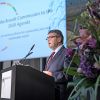What do “we” messages mean?
One word – different statements: A linguist decodes what politicians mean when they say “we”.

Germany. “We can do it” and “Yes, we can”: For some time now, many politicians have been transporting their messages with “we” slogans. What is the intention behind this rhetoric and what impact does it have? Linguist Elisabeth Wehling offers an analysis in the magazine “Cultures of We”, a publication by Institut für Auslandsbeziehungen (ifa).
No-one can escape the word “we”. It reaches out to citizens, voters and critics at the personal level. Everyone has to take up a position on this: Do I wish to belong to the “we”? Or distance myself? This is what makes this political rhetoric so forceful.
Taking the example of German Federal Chancellor Angela Merkel (“We can do it”) and former US president Barack Obama (“Yes, we can”) as well as French right-wing nationalist Marine Le Pen (“On est chez nous”; “This is our home”) the linguist explains how different the ideologies and statements of these so-called “we” campaigns are. Elisabeth Wehling differentiates between an inclusive “we” and one that marks a boundary, and between progressive and authoritarian societies.
International cooperation, for example, rests on the feeling that other people are my concern, even if they are on the other side of the globe.
Germany’s ‘we’ consciousness
“A progressive community has a caring, less hierarchical, less exclusive, more inclusive image of community,” writes Wehling. “Angela Merkel is an example of this; as a Conservative she took the middle road. The countermovement is going in the authoritarian direction.”
She continues, noting that Germany, shaped by its particular history, has “a very fresh awareness of how important it is to live together peacefully, to not assume the role of agitator on the international stage, and to take a benevolent approach in terms of foreign policy.” People who say “we” in this sense, she says, think beyond their own group.
Us against the others
Populists and nationalists, in contrast, use “we” to distance themselves from “the others”. They suggest that their own group is under threat in terms of its identity and existence, according to Wehling’s analysis. The slogans of French and British right-wing populists belong to this category.
In an interview with “Cultures of We”, Wehling points out that patriotism and assuming responsibility within the global community are not mutually exclusive. She calls on society to “not let the right-wing camp take over the idea of patriotism in an authoritarian manner.”

Elisabeth Wehling is a linguist and cognition researcher at the University of California in Berkeley. Her book “Politisches Framing” was published in 2016.
The full interview can be found here (in German and English): The political “We”
